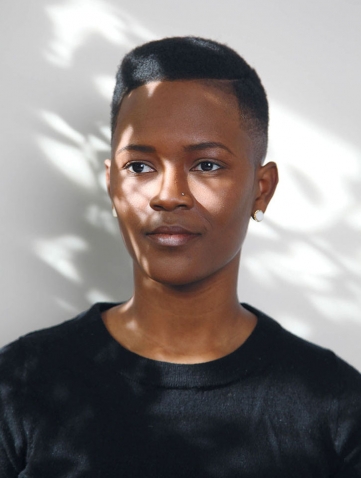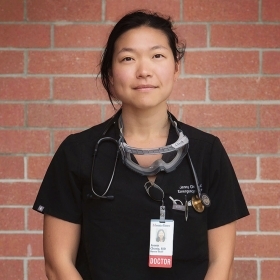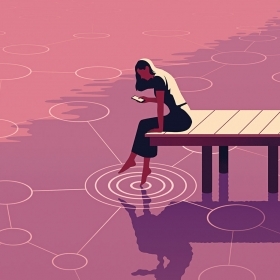Photo by Dana Smith
Growing up in Prince George’s County, Maryland, Dominique Hazzard ’12 recalls witnessing the disparities in resources among schools across her community. As a kid, she even ran some of some early campaigns around issues of representation, like launching a petition to get her school’s library to feature a book about Addy, the only Black American Girl doll. It was a success.
That early eye toward social inequity and the desire to act upon it has only sharpened over time. Now a doctoral student in history at Johns Hopkins University, Dominique is also an organizer with the Washington, D.C., chapter of the Black Youth Project (BYP), a Black-led organization that has been advocating around issues like policing long before this current uprising.
Dominique’s experience in the classroom at Wellesley particularly shaped her current orientation to the world. A class on education inequality taught by Carla Shalaby was particularly memorable, challenging an idea that she was taught in her youth, that Black people can “educate ourselves out of centuries of inequality in this country.”
“I was able to really deeply understand how anti-Blackness and white supremacy can really look in practice,” Dominique says, “and how a whole system can be designed and trick a country and a people into thinking that the goal here is to create social equality. [But] that’s not actually what it was designed to do at all.”
Revelations such as these were only further compounded by nationwide social and political shifts. Dominique entered Wellesley in 2008, witnessing President Barack Obama’s first election, and exited the year of Trayvon Martin’s murder. Having her Wellesley experience be bracketed by those moments—the first of which ushered in conversations about a “post-racial America” while the latter debunked that idea as myth—was pivotal.
“For me and probably for a lot of other people,” Dominique recalls, “having those bookend experiences, and then all of the student activism struggles that happened in between, really changed me and really helped me come to the belief that a lot of the systems and institutions and core elements of American life have to be dismantled—like this whole thing is not set up for us.”
As an organizer, she is now focusing her work on on dismantling those systems while creating new ones that meet people’s real needs and allow communities to build together and relate together in ways that don’t perpetuate harm. Organizing, Dominique says, is finding others who have a similar vision for the future and then sharpening that vision by learning about one another’s skills and studying together. In strengthening those internal bonds, organizers can then reach out and bring in other community members who are concerned about similar problems, but may not yet have the language or strategies needed.
Dominique became involved with the BYP in 2014; the group initially capturing her interest because it organizes through a Black queer feminist lens.
In D.C., groups like BYP have for years been running campaigns on issues like halting the construction of new jails and decriminalizing sex work, all while responding to community needs as they arise. That ongoing work primes them to help the public make sense of the current uprising against police violence.
“If you’re organizing every day and you have those relationships between yourselves and the community, then you can harness moments like this to really create change through direct action,” says Dominique. That ongoing work becomes a “scaffold” allowing organizers to move people to get involved, whether that means protesting, wheatpasting, or calling city council members.
Being poised to respond to this particular political moment, one that Dominique describes as a “tear in the communal consciousness” has allowed BYP and other organizers to have an immense impact. This budget cycle, the D.C. city council received 80,000 submissions specifically related to defunding the police budget. Last year, there were only 20.
The urgency of the current moment beckons sustained organized action but also meaningful self-care. Dominique takes breaks to focus on her own personal renewal, a practice that is particularly important after having experienced burnout. She says that understanding when to step out and come back is important not only as a means for preserving her energy, but also because it underscores the idea that the Movement for Black Lives is a “leaderful” movement.
“The worst thing for organizing is when everything is connected to one person or a few people, and if they have to go everything will fall apart,” says Dominique. “If you have in your mind, that I’m not always going to be here and if I am here I’m not always going to be on the front, then that will inspire you to build with the other people that you’re organizing with.”








We ask that those who engage in Wellesley magazine's online community act with honesty, integrity, and respect. (Remember the honor code, alums?) We reserve the right to remove comments by impersonators or comments that are not civil and relevant to the subject at hand. By posting here, you are permitting Wellesley magazine to edit and republish your comment in all media. Please remember that all posts are public.